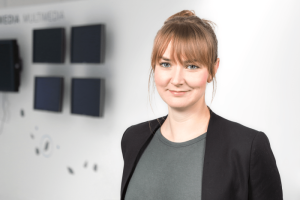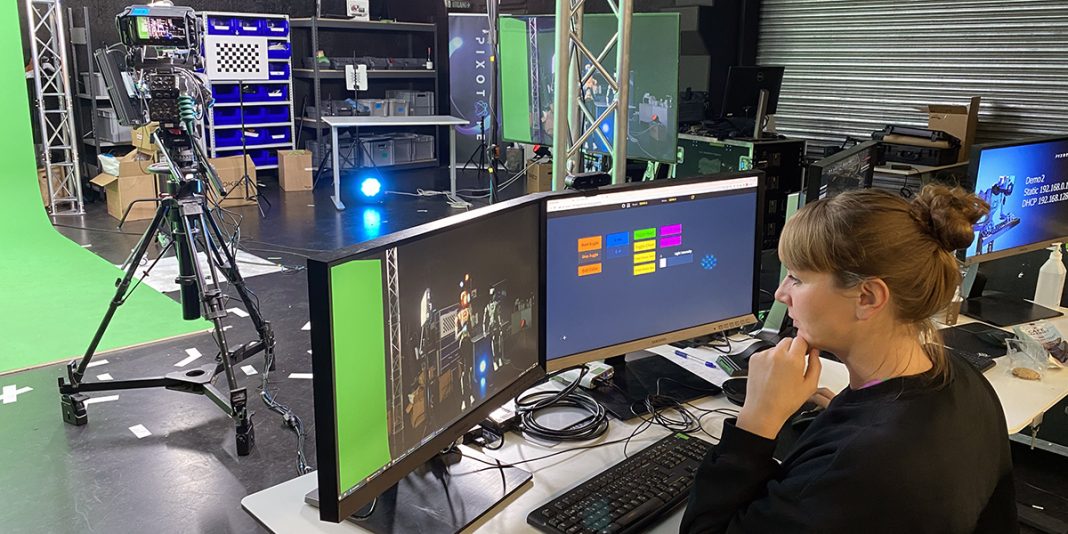A shortage of employees well-versed in the creative capabilities of virtual production (VP) has become a barrier for companies trying to meet the demands of clients or pull off the next big project. With the launch of its Education Program, Pixotope is making good on its mission to make VP accessible and available to all media producers, by investing in the next generation of talent with a community-oriented initiative for higher education institutions. Through this initiative, education institutions will have access to Pixotope’s solutions to teach – hands-on skills – while also connecting them with expert industry resources to ensure what they are learning is applicable in the real world.
“It’s our contribution to shaping the future of media production,” said Pixotope Education Program Manager, Carina Schoo, who acts as a point of contact between educational institutions, Pixotope, and industry players who want to get involved as partners in the initiative. TPi sat down with Schoo to discover more…
What was the driving force of inspiration behind this concept, and how has it gathered momentum?
“We strongly believe that virtual production will become the mainstay technology and the new standard for storytelling. That said, we’ve discovered a number of barriers to entry in this field. A severe shortage of people trained in virtual production tools and workflows, historically complicated camera tracking and graphics integration, and the prohibitive cost of infrastructure and resources are all mentioned regularly in conversations we have with industry peers and colleagues. In order to achieve our mission, we are working to find solutions to these problems across the industry.
“The Pixotope Education Program focuses on the first of these pain points, the skills shortage. Even though virtual production has been around for quite some time, it has experienced a massive surge during the past two years. Thanks to groundbreaking use cases of virtual production from sports broadcasting to Hollywood blockbusters (most notably The Mandalorian), audiences are becoming accustomed to VFX-heavy content and so there is a huge demand for this high level of production value. As a result, there is a growing demand for skilled people to produce it, but not enough trained professionals to meet it.
“For us, it was clear that for virtual production to achieve its full potential, we had to invest in the community and support the talent entering the industry. The Pixotope Education Program is a community-focused initiative to help prepare the next generation of virtual production talent. To do so, we provide educational institutions and their students with access to Pixotope software, but just as importantly, we provide them with connections to a variety of industry experts from around the world. What this does is provide students with hands-on experience to learn the necessary skills for a successful career in the industry, as well as access to a wealth of diverse knowledge that can add breadth, depth and context to curriculums. The past few months have been very exciting for the programme! We officially launched the Education Program in August, in the run up to IBC Show 2022, and since September we have seen the first intake of students into this programme. We are looking forward to seeing and supporting their growth and development as they complete their courses.”

Who else is involved in this programme?
“We are currently working with and continuing to onboard schools across the world in Asia, Europe and North America. The universities have such a broad range of programmes like Digital Media, Animation, VFX, Film and TV Production, Gaming, and Journalism, so it is exciting to see such a variety of interests and the role virtual production education plays in these different routes. In addition, we’ve seen great enthusiasm from the industry as a whole, with a number of creative agencies, production facilities and individual experts joining as partners and supporters of the programme.”
How is the programme structured?
“That’s the great thing about the Pixotope Education Program, we don’t set a standard structure, but that’s not to say that we are completely hands off. We deliberately decided not to dictate a curriculum. Instead, we have ongoing conversations with universities and educational establishments involved to understand what their needs, and the needs of their students are, and how we can support that. We provide the software, the contacts, advice and guidance, but ultimately it is adaptable to the needs and requirements of each individual institution. Another added benefit of the programme rests on the fact that our solutions are all software-based and require no proprietary hardware to work. This means that online courses become a possibility, providing access for a greater number of people.
How important is it to provide direct access and resources to Pixotope’s solutions?
“Affordable access to the software and tools that drive virtual production, as well as connections to the global Pixotope community is a keystone of the Pixotope Education Program. By having this hands-on experience it helps students to prepare for and address the realities of on-set real-time virtual production. We hope that access to tools like this provides more opportunities for learning for young people. Our ultimate goal is to help them to progress in their careers by giving them the tools to succeed and creatively problem solve in real world production environments.”
What were the major challenges in putting together this programme, and how are you and the team starting to overcome them and change the narrative?
“One of the biggest challenges was that as a company all we had was a lot of assumptions about what the educational establishments really need. Being a software vendor, we knew very well about the industry’s needs and what is lacking – mainly well-trained talent – but we could only assume what the schools needed. So the first step in developing this programme was to verify our assumptions by talking to the educators. This has been very time consuming but definitely rewarding. Aside from the fact that I get to speak to interesting people from all over the world, having genuine conversations with them helped tremendously in understanding more about the processes in academia and the students’ concerns. As a result, we could easily confirm or refute our assumptions. Building on this, we managed to create an outline of our programme and shortly after the official launch, were able to onboard the first institutions. We have already noticed that the word is getting around and we’re being contacted by educational institutions that have heard about our programme. We take this as a great sign that we are already changing the narrative.”
What sets this education programme apart from others, if any, within the live entertainment/events sector?
“The main thing that sets this programme apart is that it’s not a thinly veiled sales pitch. It’s about giving the next generation of talent access to the equipment and expertise they need at an accessible and un-intimidating level. The Pixotope Education Program is uniquely positioned in that we collaborate with educational institutions to provide them with access to the virtual production tools and experts they need. There are countless types of virtual production academies out there, i.e., online training and certification courses from companies to further educate yourself. However, we believe that our approach, tailoring to the individual needs of the educational institution, instead of providing a set training course, offers a greater ability to shape the virtual production experts of the future. An added bonus, though not a requirement of joining our Education Program, is that educational institutions will have the option of certifying students and educators as Pixotope Experts, with the qualifying skill set and knowledge. This certification will be recognised across the industry and provide a common baseline for virtual production capabilities.
“Primarily, we are focused on building a community to foster connections between students and industry insiders. Our goal is to create a space for constant learning and discourse about the fast-evolving world of virtual production, even after students graduate and enter the workforce. The Pixotope Education Program is more than a software trade out, it’s a community and talent pipeline.”
As a woman in the tech sector, how important is it to inspire other women and those from all backgrounds to enter what is considered a largely male-dominated sector?
“Tech, in particular the immersive media technology industry, is an area I have always found incredibly exciting. I have spent most of my professional life working with immersive imaging technologies and virtual solutions. Diversity in creative industries is so important in order to discover new ways of approaching solutions and production in this industry, and it is how you are able to get amazing results that not everyone would think of. It is part of the reason I am so passionate about the Pixotope Education Program: I hope it is able to provide any young person regardless of gender or background, with access to this incredible industry, see a variety of opportunities ahead of them, and fall in love with it like I did. In my career, I have met some incredibly talented outstanding women who have inspired me a lot. Since our industry is largely male dominated, I really do see it as my responsibility to be visible and to inspire others myself as much as I can in order to fuel diversity.”
Do you have any final thoughts or key takeaways from this experience?
“The opportunity to join Pixotope as their Education Program Manager, a newly created role, to build an Education Program from scratch has been very challenging but also incredibly exciting and rewarding. The fact that everyone I talk to is so passionate about this topic and is eager to educate the next generation of talent in the media production industry makes this experience a very positive one. It also shows me that what Pixotope is doing with this initiative is absolutely needed, on the industry side as well as on the academic side. We have found some fantastic partners that have joined or are about to join the programme and I couldn’t be more excited to work with them to make a difference for the future of the industry.”
www.pixotope.com/pixotope-education-program





